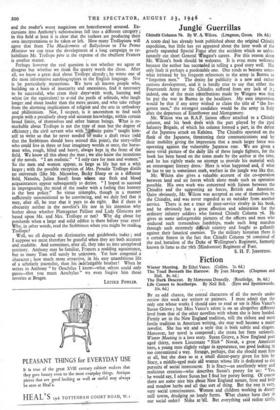Jungle Guerrillas
Chindit Column 76. By W. A. Wilcox. (Longman, Green. 10s. 6d.)
A GOOD deal has already been published about the original Chindit expedition, but little has yet appeared about the later work of the greatly expanded Special Force after the accident which so unfor- tunately cut short General 'ingate's career. For this reason alone Mr. Wilcox's book should be welcome. It is even more welcome because the author has succeeded in telling a good story well. His only fault is perhaps a pardonable one. One tends to become some- what irritated by his frequent references to the army in Burma as " forgotten men." The desire for publicity is a new and rather curious development, and it is hardly true to say that either the Fourteenth Army or the Chindits suffered from any lack of it ; indeed, one of the main contributions made by Wingate was that he put the war in Burma in the headlines. My own impression would be that if any army wished CO claim the title of " the for- gotten men," the strongest candidate would be the army in Italy after the departure of Eisenhower and Montgomery.
Mr. Wilcox was an R.A.F. liaison officer attached to a Chindit column, and his book deals with the part played by the 23rd Infantry Brigade, of which his column formed a part, in the defeat of the Japanese attack on Kohima. The Chindits operated on the flank of the Japanese, threatening their communications and by their mobility giving the impression that a much larger force was operating against the vulnerable Japanese rear. We are given a most vivid picture of the daily life of these jungle fighters, for the book has been based on the notes made by the author at the time, and he has rightly made no attempt to provide his material with an extravagant literary dress. Here is what happened and, if what he has to say is sometimes stark, warfare in the jungle was like that.
Mr. Wilcox also gives a valuable account of the co-operation between land and air forces which alone made such an operation possible. His own work was concerned with liaison between the Chindits and the supporting air forces, British and American. Quite obviously, Mr. Wilcox was accepted as one of themselves by the Chindits, and was never regarded as an outsider from another service. There is not a trace of inter-service rivalry in his book, and he obviously has a great affection and admiration for the ordinary infantry soldiers who formed Chindit Column 76. He gives us some unforgettable pictures of the officers and men who endured such tremendous hardships, made such long marches through such extremely difficult country and fought so gallantly against their fanatical enemies. To the military historian there is a certain fitness in the fact that Chindit Column 76 consisted of the 2nd battalion of the Duke of Wellington's Regiment, formerly known ro fame as the 76th (Hindoostan) Regiment of Foot.
S. H. F. JOHNSTON.


























 Previous page
Previous page